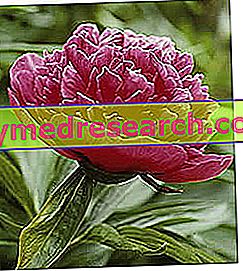Generality
Description and botanical outline of ginger
Ginger is a food (edible root) that mainly has the role of spicy spice, with a pleasant, warm and pungent aroma.
It appears as a species of "tuber", with a decidedly irregular shape, more or less elongated and lumpy, of a variable color between brown and pale yellow.

Active ingredients of ginger
The active ingredients that characterize ginger are
- Gingeroli (bitter and pungent)
- Gingerol derivatives (zingerone and shogaoli)
- Volatile components of essential oil (1-3%: sesquiterpenes such as zingiberene and B-bisabolene, together with various monoterpenes).
Kitchen
Function of the ginger in the kitchen
The active ingredients that determine the phytotherapeutic properties of ginger also contribute to characterize the classic pungent taste, particularly appreciated in oriental cuisine. Because of these characteristics, ginger is used as a spice and more generally as a flavoring. For this purpose it can be added fresh, cut into whole or minced thin slices, or preserved in powder obtained by drying and grinding the rhizome.
As an aroma, ginger is an inevitable ingredient of many types of sushi, meat and fish tartare, cold sauces and in general of many first and second courses.
In the Middle Ages, with the Arabs, ginger made its official entry into European cuisine, so much so that today we also find it in traditional dishes, such as the Ferrara pampepato and the famous gingerbread, so dear to the Anglo-Saxons.
Ginger is widely used as an aroma for soft drinks, beers and liqueurs.
Ginger is therefore a real food, however it is good to respect its use as a spice avoiding direct consumption as a side dish; below we will understand better why.
How to peel ginger easily and without waste
X Go to the Video Page Go to the Video Recipes Section Watch the video on youtubeVideo Ginger Recipes
Therapeutic indications
When to use ginger?
Ginger is useful as a herbal remedy in the presence of:
- Nausea in pregnancy, during which it must be taken with prior medical consent
- Motion sickness
- Nausea and vomiting from drug therapies (chemotherapy, antiviral for HIV)
- Post-operative nausea and vomiting
- Abdominal tension
- Bad digestion
- Diarrhea
- Flatulence
- lack of appetite
- Irritable bowel syndrome
- Dyspepsia
- Colic.
Secondary indications include: relief from the pain of rheumatoid arthritis (RA), osteoarthritis, menstrual pain, upper respiratory tract infections, cough, respiratory problems, headache, bronchitis and diabetes.
Sometimes ginger is also used for chest, stomach and stomach pain, discontinuation of SSRI medication, anorexia, to increase milk production, diuresis and sweating. It is also used in traditional medicine to treat cholera, bleeding, intestinal infections, baldness, malaria, inflamed testicles and poisonous snake bites.
Fresh juice can be indicated to treat burns.
Ginger oil is mildly pain reliever and insect repellent.
Property and Effectiveness
What benefits has ginger shown during the studies?
The phytotherapic applications of ginger (or ginger) are many and varied; the most known and documented concern the antinausea effect.
Chinese sailors have used ginger against seasickness since ancient times; not surprisingly, in a study conducted on a group of cadets of the navy, ginger root proved to be much more effective than placebo in reducing vomiting.
The antiemetic efficacy seems even similar, if not superior, to that of clopramide (Plasil ®), but the major certainties relate to its usefulness in pregnancy, during which the antinausea effect was shown to be comparable to that of vitamin B6 (pyridoxine ).
There is less scientific evidence about the usefulness of ginger in the GENERAL treatment of motion sickness (car sickness, aircraft sickness, etc.), as well as post-operative nausea and vomiting or post-treatment with anticancer drugs (cyclophosphamide type) .
Another well-known and documented application of ginger is its use in the treatment of dyspepsia, that is of that variegated group of symptoms associated with a difficult and laborious digestion (belching, stomach swelling, nausea, meteorism and flatulence). Ginger powder for oral use is able to stimulate the normal peristaltic movements of the stomach and intestine (prokinetic effect).
There are also numerous evidences about its cholagogue effect, useful for stimulating liver function; this positive action on bile secretion would also justify the presumed cholesterol-lowering effect.
Some research shows that taking ginger can modestly reduce pain in some people with osteoarthritis.
According to popular tradition, ginger would have aphrodisiac and anti-inflammatory properties; the latter effect is however really based on the ability to inhibit cyclooxygenase and lipoxygenase.
In topical (external) use ginger is used as a revulsive and as such is present in various antirheumatic preparations.
Doses and Mode of Use
How to use ginger?
The daily doses used during the studies, which have investigated the phytotherapeutic properties, vary from 0.5 to 4 grams of pulverized and dried drug per day. Alternatively, ginger is readily available in the form of dried rhizome. For a phytotherapeutic purpose, however, the dry extracts are to be preferred as they are standardized in the active ingredients that characterize the drug (gingerols).
- Regarding the prevention of nausea and vomiting associated with motion sickness or motion sickness, it is recommended to take a single dose of 1-2 grams of dried and powdered rhizome, one hour before starting the journey.
- In the treatment of mild gastric and intestinal dyspeptic disorders (poor digestion, sense of fullness, borborigmi, flatulence, slow digestion) it is necessary to take a single dose of 180 mg three times a day, of dried and powdered rhizome.
The doses refer to the average adult and are not recommended for use under the age of 18.

To obtain a milder action it is possible to resort to tea (infusions and decoctions of ginger), generally indicated for their digestive and "heating" action; for this purpose 30g of fresh rhizome are finely chopped in 1 liter of water, to be left in decoction for about 3 minutes, filtering and then drinking a cup after the main meals. By replacing the fresh ginger rhizome with the dried powder you get a herbal tea with a more marked "therapeutic" effect, for which it is advisable to take it under medical supervision.
Side effects
Excessive intake of ginger can cause:
- Pain and heartburn
- Intestinal disorders with flatulence and diarrhea.
Contraindications
When should ginger not be used?
It is advisable to take particular caution when taking ginger in:
- Pregnancy and breastfeeding*
- Presence of biliary calculi
- Pyrosis (heartburn): ginger can further stimulate gastric secretion.
- Concomitant use of certain drugs
- Hemorrhagic disorders: ginger could increase the risk of bleeding
- Diabetes: ginger could increase insulin levels and / or lower blood sugar. As a result, diabetes drug therapy may require adaptation
- Uncomfortable heart conditions: high doses of ginger could worsen some heart diseases.
* Although some experimental studies suggest the possible mutagenicity of some of its components, at the doses of normal use ginger seems a safe remedy. Possible side effects in this sense have in fact been denied by various studies; in any case, just like any other supplement or phytotherapeutic product, the use of ginger in pregnancy must be previously discussed with your doctor.
Pharmacological Interactions
Which drugs or foods can interact with ginger?
Due to its antithrombotic effect, individuals treated with oral anticoagulants (such as warfarin) or NSAIDs (aspirin type) should take ginger cautiously and under medical supervision.
Since there is the possibility that ginger reduces blood sugar, it may be necessary to change the drug dosage to prevent any complications.



